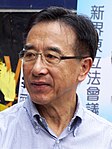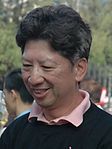Hong Kong Legislative Council elections, 2004
|
|
|||||||||||||||||||||||||||||||||||||||||||||||||||||||||||||||||||||||||||||||||||||||||||||||||||||||||||||||||||||||
|
|||||||||||||||||||||||||||||||||||||||||||||||||||||||||||||||||||||||||||||||||||||||||||||||||||||||||||||||||||||||
|
|||||||||||||||||||||||||||||||||||||||||||||||||||||||||||||||||||||||||||||||||||||||||||||||||||||||||||||||||||||||
|
|
|||||||||||||||||||||||||||||||||||||||||||||||||||||||||||||||||||||||||||||||||||||||||||||||||||||||||||||||||||||||
| Elected candidates by each constituency | |||||||||||||||||||||||||||||||||||||||||||||||||||||||||||||||||||||||||||||||||||||||||||||||||||||||||||||||||||||||
|
|||||||||||||||||||||||||||||||||||||||||||||||||||||||||||||||||||||||||||||||||||||||||||||||||||||||||||||||||||||||
The 2004 Hong Kong Legislative Council election was held on 12 September 2004 for members of the Legislative Council of Hong Kong (LegCo). The election returned 30 members from directly elected geographical constituencies and 30 members from functional constituencies, of which 11 were unopposed.
A record number of 3.2 million people registered to vote in the election. The turnout rate was an unprecedented 55.6% with 1,784,406 voters casting ballots, beating the previous record set in 1998 by 200,000 votes. While pro-democratic opposition candidates gained new seats in the legislature, their gains fell short of their expectations.
In the geographical constituencies, candidates from the pro-democratic camp secured 60 percent of the seats in the geographical sectors of the election, taking 18 seats (up from 17) in this category, and 62 percent of the popular vote. On the other hand, the pro-Beijing and pro-business candidates made greater gains, winning 12 directly elected seats (up from 7). Ironically, in the functional constituencies which the pro-democratic camp sought to abolish, the camp made more gains (from 5 to 7 seats).
Overall, the democrats took 25 seats and the pro-government camp 35 seats. Bills initiated by the government can still be passed on pro-government support alone, but bills originated by members cannot be passed without democratic support, since these bills require absolute majorities in each sector (geographical and functional) of the legislature. Constitutional amendments require a two-thirds vote and thereby also require support from the democratic camp.
...
Wikipedia







